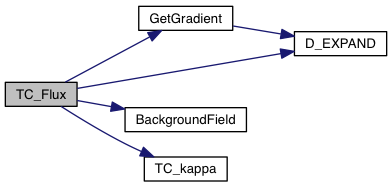|
PLUTO
|
|
PLUTO
|
Thermal conduction (TC) module header file. More...
Go to the source code of this file.
Functions | |
| void | TC_Flux (double ***, const State_1D *, double **, int, int, Grid *) |
| void | TC_kappa (double *, double, double, double, double *, double *, double *) |
| void | GetGradient (double ***, double **, int, int, Grid *) |
Thermal conduction (TC) module header file.
Contains prototypes for the thermal conduction module.
Definition in file tc.h.
| void GetGradient | ( | double *** | , |
| double ** | , | ||
| int | , | ||
| int | , | ||
| Grid * | |||
| ) |
Definition at line 4 of file tc_functions.c.


| void TC_Flux | ( | double *** | T, |
| const State_1D * | state, | ||
| double ** | dcoeff, | ||
| int | beg, | ||
| int | end, | ||
| Grid * | grid | ||
| ) |
Compute the thermal conduction flux, state->par_flx.
| [in] | T | 3D array containing the dimensionless temperature |
| [in,out] | state | pointer to a State_1D structure |
| [out] | dcoeff | the diffusion coefficient needed for computing the time step. |
| [in] | beg | initial index of computation |
| [in] | end | final index of computation |
| [in] | grid | pointer to an array of Grid structures |
Definition at line 57 of file tc_flux.c.


| void TC_kappa | ( | double * | v, |
| double | x1, | ||
| double | x2, | ||
| double | x3, | ||
| double * | kpar, | ||
| double * | knor, | ||
| double * | phi | ||
| ) |
Compute thermal conduction coefficients.
| [in] | v | array of primitive variables |
| [in] | x1 | coordinate in the X1 direction |
| [in] | x2 | coordinate in the X2 direction |
| [in] | x3 | coordinate in the X3 direction |
| [out] | kpar | pointer to the conduction coefficient  in the direction of magnetic field in the direction of magnetic field |
| [out] | knor | pointer to the conduction coefficient  perpendicular to magnetic field perpendicular to magnetic field |
| [out] | phi | pointer to the parameter  controlling the magnitude of the saturated flux. controlling the magnitude of the saturated flux. |
Definition at line 20 of file tc_kappa.c.
